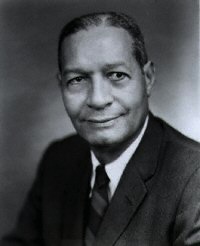
Theodore M. Berry
Theodore M. Berry was born on this date in 1905. He was a Black lawyer and politician.
He was born in Maysville, a small town on the banks of the Ohio River, to a white father, a farmer he met only once, and a deaf black mother who communicated with him only in sign language. As a child, he sold newspapers, shined shoes, shoveled coal, delivered laundry, shelved books in local libraries, and worked as a desk clerk at the 'Black' YMCA in Cincinnati, where he roomed during high school.
He was the commencement orator and senior-class valedictorian of Woodward High in June 1924. To enter the essay contest, he submitted his oration “The Chaos Beyond” under the pen name Thomas Playfair. The white teacher-judge panel rejected his initial entry under his name, 'Lincoln and the Constitution.'
The Playfair essay won. When its real author was revealed, Berry was forbidden to walk in the commencement procession with a white female classmate. He walked alone, the first Black valedictorian in the school's history. In 1926, his mother died having never heard her son speak, but Berry grew up carefully enunciating his words so that she could lip-read. From it, he mastered diction, a skill that drove him throughout his career. He paid his way through the University of Cincinnati law school by working at Newport steel mills. He was admitted to the Ohio Bar in 1932 and, six years later, was appointed the first Black assistant prosecuting attorney for Hamilton County.
Also, in 1938, he married the former Johnnie Mae, Elaine Newton. Berry became a pivotal civil rights attorney for the National Association for the Advancement of Colored People (NAACP). In 1942, Berry became a morale officer for the Office of War Information under President Franklin D. Roosevelt, switching his political allegiance from Republican to Democrat. After WW II, he returned to the NAACP and, from 1947 to 1961, served on the Ohio Committee for Civil Rights Legislation. He won a seat on Cincinnati City Council in 1949, and in 1953, he was appointed chairman of the finance committee.
Berry became vice mayor in 1955. He lost re-election in 1957 and then returned in 1963. The following year, Berry created Cincinnati’s first Community Action Commission, which drew the attention of the new Office of Economic Opportunity (OEO) in Washington, D.C. In 1965, President Johnson appointed him as head of OEO’s Community Action Programs (CAP), which included Head Start, Jobs Corps, and Legal Services. He returned to Cincinnati and, in December 1972, became the city's first Black mayor.
In 1986, Berry helped revive preference voting, in which a voter ranks the candidates by his or her preference (1, 2, 3) in Cincinnati. That year, the Hamilton County Rainbow Coalition invited him to debate the merits of preference voting and district elections. After the debate, the Coalition led an initiative campaign to return preference voting to Cincinnati. That effort brought preference voting to the ballot in November 1988, the first Cincinnati preference voting referendum since 1957.
In 1990, Berry spoke to members of the Cincinnati Bar Association, an organization that had rejected him decades earlier because of the color of his skin. “He told them about being rejected and said I forgive you.” In 1992, Berry gave the keynote speech at the founding national conference of the Center for Voting and Democracy (then Citizens for Proportional Representation).
In March 1995, Berry again testified on preference voting behalf before a Cincinnati charter commission. Theodore Berry died on October 15, 2000.
University of Cincinnati Achieves
The Voice of Black Cincinnati.com
The African American Atlas
Black History & Culture an Illustrated Reference
by Molefi K. Asanta and Mark T. Mattson
Macmillan USA, Simon & Schuster, New York
ISBN 0-02-864984-2